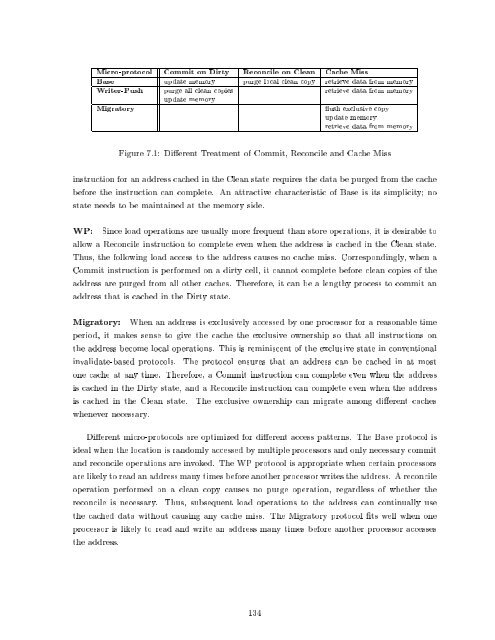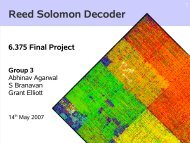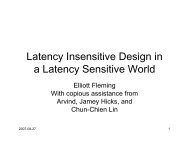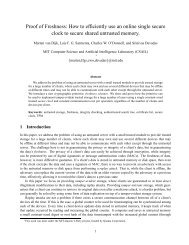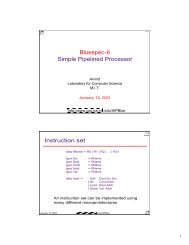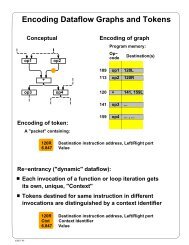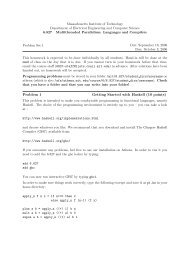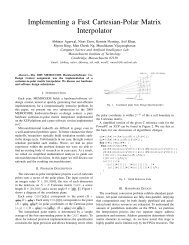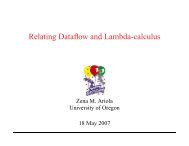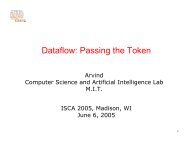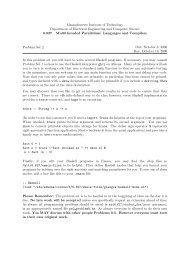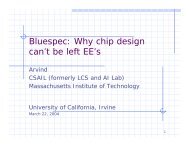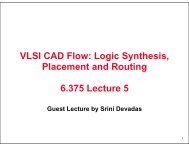Design and Verification of Adaptive Cache Coherence Protocols ...
Design and Verification of Adaptive Cache Coherence Protocols ...
Design and Verification of Adaptive Cache Coherence Protocols ...
You also want an ePaper? Increase the reach of your titles
YUMPU automatically turns print PDFs into web optimized ePapers that Google loves.
Micro-protocol Commit on Dirty Reconcile on Clean <strong>Cache</strong> Miss<br />
Base update memory purge local clean copy retrieve data from memory<br />
Writer-Push purge all clean copies retrieve data from memory<br />
update memory<br />
Migratory ush exclusive copy<br />
update memory<br />
retrieve data from memory<br />
Figure 7.1: Di erent Treatment <strong>of</strong> Commit, Reconcile <strong>and</strong> <strong>Cache</strong> Miss<br />
instruction for an address cached in the Clean state requires the data be purged from the cache<br />
before the instruction can complete. An attractive characteristic <strong>of</strong> Base is its simplicity no<br />
state needs to be maintained at the memory side.<br />
WP: Since load operations are usually more frequent than store operations, it is desirable to<br />
allow a Reconcile instruction to complete even when the address is cached in the Clean state.<br />
Thus, the following load access to the address causes no cache miss. Correspondingly, when a<br />
Commit instruction is performed on a dirty cell, it cannot complete before clean copies <strong>of</strong> the<br />
address are purged from all other caches. Therefore, it can be a lengthy process to commit an<br />
address that is cached in the Dirty state.<br />
Migratory: When an address is exclusively accessed by oneprocessor for a reasonable time<br />
period, it makes sense to give the cache the exclusive ownership so that all instructions on<br />
the address become local operations. This is reminiscent <strong>of</strong> the exclusive state in conventional<br />
invalidate-based protocols. The protocol ensures that an address can be cached in at most<br />
one cache at any time. Therefore, a Commit instruction can complete even when the address<br />
is cached in the Dirty state, <strong>and</strong> a Reconcile instruction can complete even when the address<br />
is cached in the Clean state. The exclusive ownership can migrate among di erent caches<br />
whenever necessary.<br />
Di erent micro-protocols are optimized for di erent access patterns. The Base protocol is<br />
ideal when the location is r<strong>and</strong>omly accessed by multiple processors <strong>and</strong> only necessary commit<br />
<strong>and</strong> reconcile operations are invoked. The WP protocol is appropriate when certain processors<br />
are likely to read an address many times before another processor writes the address. A reconcile<br />
operation performed on a clean copy causes no purge operation, regardless <strong>of</strong> whether the<br />
reconcile is necessary. Thus, subsequent load operations to the address can continually use<br />
the cached data without causing any cache miss. The Migratory protocol ts well when one<br />
processor is likely to read <strong>and</strong> write an address many times before another processor accesses<br />
the address.<br />
134


